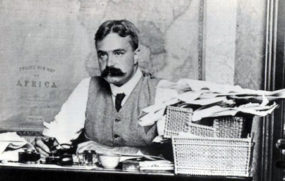
In the 1890s, a clerk at a Liverpool based shipping line whose steamers had a monopoly on carrying all cargo to and from the Congo came upon a discovery that would drastically change the course of his life. The bilingual Edmund Dene Morel was often sent to Belgium to supervise the arrival and departure of the ships from Antwerp, Belgium to Boma, Congo.
While in Antwerp, he observed that only guns, chains, ammunition and articles remote from trade purposes were loaded on the ships to Congo. No commercial goods were being exchanged for the great quantities of valuable rubber and ivory which the ships brought back to Belgium . Other signs of slave labor and mass killings surfaced which prompted the twenty eight year old Morel to inform his boss. His boss not only turned a deaf ear to his complaints but promoted and reassigned him to other tasks in order to prevent his outspokenness from upsetting the King of Belgium and jeopardizing the company’s relationship with its most profitable client.
Unlike the others who were aware of the brutality of the King of Belgium’s private army (Force Publique) in the Congo, Morel spoke out vehemently and eventually quit his job in 1901. Ignoring the temptation of sacrificing the truth within him for the material comfort of his ever growing family, the financially strained Morel turned down a bribe from the king’s representative. He, who from a materialistic point of view had nothing to gain in his crusade against the king’s atrocities in the Congo, but only a promising career at the prominent shipping company to lose, devoted the next ten years of his life to bringing to light perhaps the first wide spread massacre of the 20th century; one which would claim the lives of millions of Congolese.
The former shipping clerk turned writer would gather detailed information of the king’s operations in the Congo and successfully make known the suffering of millions in a distant continent at the hands of a man who once convinced the western world at the Berlin Conference of 1885 that his sole interest in acquiring the Congo was merely philanthropic.
There are times in the life of every man who aspires to live nobly when his belief in his noble principles are tested to the utmost, his response in these times of trial reveal whether his belief is truly alive and has thus become conviction!
